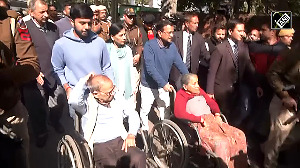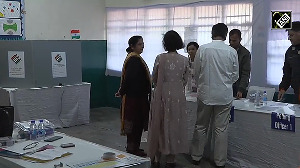
The third of a four-part series. Read Part 1, Part 2
Seraj Ahmad, a commerce student at Aligarh Muslim University, has just returned from Delhi. With a changed perception of his countrymen.
On his way back on a crowded passenger train, he felt the heat of the anti-Islam sentiment that has gripped parts of India in recent months. Seated inside the university canteen, he shares his anguish with his friends:
"It has become difficult to be a Muslim. You cannot have your own identity. Why is this happening? I fear things are going to be worse."
On the train, Ahmad asked a stranger to move aside a bit. The stranger, taking in Ahmad's beard which marks him a Muslim, started shouting at him.
"He called me a terrorist," Ahmad says. "He said I should be thrown out of the compartment! He went on to abuse the entire community just because I wore a beard."
"I was shocked For a trivial issue like this, people go to the extent of calling all Muslims terrorists! I had no option but keep quiet."
A silence, and he adds, "Such a situation will force anybody to take up terrorism."
Initial inquiries into the recent terror strikes in India show educated Muslim professionals, with brilliant careers before them, were behind planting bombs in public places. Masood Ahmad, AMU's chairman of the department of biochemistry, attempts an explanation to this trend with a question:
"Why should educated youths ruin their career unless there is an abnormal situation in the country?"
But he is quick to add, "There are so many non-Muslims fighting for the cause of Indian Muslims. A few [Muslim] youths mistakenly coming in the trap of vested interest is an exception, not the rule."
Nadim Asrar, a research student and former president of the AMU Students Union, had this to say of the alienation Muslims feel:
"Every time a bomb blast happens, some Muslims and religious people are named and arrested even before any inquiry is done. They have not yet solved any single case. This raises suspicion.
"Even if Muslims are involved and, as they now say, educated Muslims, there is no sincere effort to address the root cause. Instead, people are trying to take political benefit out of the situation."
A few other students join the discussion, expressing their angst at the "propaganda against Muslims."
"There may be a small section [of Muslims involved in terrorism]," says Sauban Ghani, a research scholar in chemistry. "But they should not be associated with any community. I see there is an attempt to portray practicing Muslims as terrorists. And this has gone deep into the psyche of ordinary Hindus."
In this, Mohammad Sajjad, who teaches history at Delhi's Jamia Millia Islamia, sees a conspiracy to brand the community as terrorists and thus divide Hindus and Muslims for electoral benefits in the forthcoming assembly and Lok Sabha polls.
"Earlier, the underworld, the underprivileged and rowdies were accused in terrorist activities," he says. "Now educated and professionals are being caught. Though nothing has been proved yet, it has been portrayed as if there is an exodus of educated Muslim youth into extremism."
Many students say they have little faith in police investigations. Innocents, they feel, are being implicated for ulterior motives.
An AMU student presents the case of a hostel mate. The police are looking for him because he issued a statement in support of the banned Students Islamic Movement of India to a television channel. The student had to flee the university without completing his course.
"The BJP is trying to create security as an election issue," says Asrar. "So there is an exaggerated threat perception. This will divide the country and is very dangerous."
Many feel the Gujarat government's "support to criminals" during the riots there, and the "failure" of the legal process has further alienated Muslims.
Educated people moving towards violence is nothing new, Sajjad argues. "We have examples during the freedom struggle. Some of the sharpest students joined revolutionary movements. When the established mode of politics failed to deliver justice, some educated and desperate people moved towards such activities. This is exactly what is happening now."
Adds Masood Ahmad, "When nobody is listening to the voice of the uneducated and unemployed, educated people will obviously raise their voice."
This trend worries the police. Says Delhi Joint Commissioner of Police Neeraj Kumar, "This is something politicians will have to look into. Our job is to find the culprit."
Design: Uday Kuckian






 © 2025
© 2025